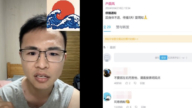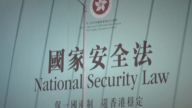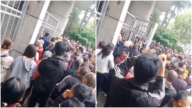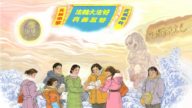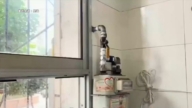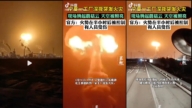【新唐人2014年04月22日讯】4月19号,中国《胡润百富榜》发布了《中国富豪特别报告》。报告说,在“百富榜”发布的15年里,有27位上榜富豪犯罪入狱,占上榜总人数的1.2%,有过半数人被判有期徒刑10年以上。那么,是什么原因使得这些富豪入狱呢?请看以下分析报导。
从1999到2013年,登上《胡润百富榜》的富豪人数为2,188位,其中27位是“问题富豪”,占上榜总人数的1.2%。
这些“问题富豪”中,超过半数的人年龄在40到49岁之间,46岁是被判刑时的平均年龄。而贪污贿赂、侵犯财产和妨害对公司、企业的管理秩序等,是富豪出问题的三大主因。
报告显示,这27名富豪被判刑的罪名共有65条,平均每人2.5条。其中“贪污贿赂罪”是富豪入狱的最主要原因,其中犯“单位行贿罪”的比例最大,有7人。
另外,在涉及“侵犯财产罪”中,“职务侵占罪”和“挪用资金罪”的比例最高。
时事评论员蓝述认为,中共把中国传统文化破坏了,这些富商在没有道德的约束后,跟这些贪官污吏打交道中很容易学坏,从而走上犯罪道路。
时事评论员蓝述:“在中国社会里面无官不贪,你生意稍微做大一点那就要跟这些贪官污吏打交道。你跟贪官污吏打交道,这个钱进进出出你怎么入账啊?送出去的钱、进来的钱,是灰色收入或者是灰色支出?”
蓝述表示,中共官员现在几乎没有干净的,高层搞反贪也是选择性的打击政敌,那些与政敌有联系的富豪,就成了中共内斗的牺牲品。
如﹕2005年被《胡润百富》杂志列为中国首富的黄光裕,在2009年,因犯非法经营罪、内幕交易罪、单位行贿等罪,被判有期徒刑14年。而根据国务院有关人员透露,黄光裕案是公安部部长孟建柱与上届总理温家宝联盟,搞掉郑少东、打击周永康的动作。
旅美中国问题评论人士李善鉴:“中国这个富豪基本上都是最近几年涌现的。他并不是因为很聪明、很能干,也不是因为自己祖辈上就有这个家业、就有这个资产,而是多半通过这种权钱交易、这种不正当的手段来获得的这种资产。”
还有,山西女商人丁书苗,因涉嫌行贿前铁道部长刘志军被起诉,其中涉非法经营的金额达1,788亿元,向刘志军行贿4900万元﹔而前上海富豪周正毅和张荣坤,因为与中共高官陈良宇、黄菊以及江泽民家族的关系而迅速爆富,但也因牵连陈良宇、黄菊等官员,而分别被判处有期徒刑16年和19年。
“中国社会科学院私营企业主群体研究中心”副秘书长吕鹏,今年1月在上海《东方早报》发表了关于“中国富豪从哪来”的研究成果。他选择的研究对像,是2003到2012年,所有曾在“胡润”或“福布斯”富豪榜上出现过的富豪。
吕鹏研究发现,15.6%富豪的父亲,曾经担任过党政机构和企事业单位干部,其中中国富豪荣智健的父亲荣毅仁,曾于1993到1998年担任中共国家副主席,而王健林的父亲,曾任西藏自治区的副主席﹔另外,43.6%富豪曾在“体制内”工作过,如原深圳市委常委、深圳市副市长叶澄海,以及曾担任“华南电子进出口公司”常务副总经理的黄宏生等。
旅美中国问题评论人士李善鉴指出,中国真正的富人是那些“红色家族”的人,他们的财产难以统计,外人也难以知道。
2012年底,美国《彭博社》经济网站经过极为慎密的调查后,发现中共“八大红色家族”的后代们,不仅控制者中国,他们的财富也是惊人,仅王震儿子王军,邓小平的女婿贺平,陈云儿子陈元,这三人所占有的财富就多达1万6000亿美元。
而今年国际媒体也曝光了中共“红色资产”,通过持有离岸公司转移巨额资产,隐藏巨额财富的做法。报告显示,自2000年以来约有4万亿美元的资产从大陆流出。
采访/朱智善 编辑/宋风 后制/孙宁
27 of Hurun ‘s Richest Chinese Jailed in 15 Years
Hurun Report published a special report on April 19, of the
15 years of Hurun China rich people, 27 were jailed,
accounted for 1.2% of reported.
More than half of them were jailed for more than 10 years.
What are the causes for these rich Chinese to be jailed?
Please follow our report.
Between 1999 and 2013, 27 of the 2,188 Chinese who made it
to the Hurun China Rich were the ‘problem rich ‘, accounting
for 1.2% of the total number of the list.
Age 46 is the average year when the problem riches were
sentenced.
Corruption & bribery, property violation and disrupting the
managerial order of companies and enterprises are the three
main charges against the rich.
The report showed there were a total of 65 charges against the
27 richest Chinese, that is 2.5 charges per person.
They were sentenced mainly for corruption & bribery, of which,
offering a bribe to a unit was the most often seen charge against
7 people.
In addition, crime of duty aggressiveness and crime of capital
embezzlement are the most often seen charges in the crime of
property violation.
Commentator Lan Su believes that the Communist Party has
destroyed traditional Chinese culture.
In the lack of moral constraints, these wealthy Chinese are
easily able to work with corrupt officials and carry out criminal
activities.
Lan Su, commentator: “The corrupt officials fill Chinese
society nowadays.
Any decent sized business would require dealing with the
government.
To work with these corrupt officials, how can you balance
the book? Should they be the gray income or gray expense?"
Lan Su indicates there ‘s barely any innocent Chinese official
in the regime.
Even the anti-corruption campaign is selectively engaged with
political opponents.
Those rich businessmen in relationship with the opponents
become the sacrifice of the internal struggle of the Communist
Party.
Take Huang Guangyu as an example, the Hurun richest
Chinese in 2005. He was sentenced to 14 years
imprisonment for crimes of illegal business operation, insider
trading, bribery and offering a bribe to a unit.
Sources from the State Council revealed that Huang Guangyu ‘s
case was intended to overthrow Zheng Shaodong and
Zhou Yongkang through the coordinated work of the Minister
of Public Security Meng Jianzhu and former Premier Wen Jiabao.
Li Shanjian, China issue commentator: “The rich Chinese
have just emerged in recent years.
It is not because they were very smart or capable, and their
wealth is not inherited either.
They have become the rich Chinese mostly because of the
colluding of money and power, through improper means."
Shanxi businesswoman Ding Shumiao was indicted for
bribing Minister of Railways Liu Zhijun with the amount of
49 million yuan, and collecting illegal operating funds of
178.8 billion yuan.
Former Shanghai billionaires Zhou Zhengyi and Zhang Rongkun
were overnight richest because of their relationship with high
officials and their relatives such as Chen Liangyu, Huang Ju,
and Jiang Zemin.
However, they were also sentenced to 16 years and 19 years,
respectively, for implication in the charges against
Chen Liangyu and Huang Ju.
Shanghai local newspaper reported a research paper conducted
by Shanghai Academy of Social Sciences in January about
where the Chinese rich came from.
Researcher Lu Peng targeted the rich Chinese on the Hurun
Report or Forbes rich list between 2003 and 2012.
Lu Peng found that 15.6% of the riches ‘ fathers were cadres
of the party or the enterprise units.
For example, Chinese tycoon Rong Zhijian ‘s father, Rong Yiren
was Vice President of the regime between 1993 and 1998;
China’s richest person Wang Jianlin ‘s father was once the Vice
Chairman of the Tibet Autonomous Region.
In addition, 43.6% of the rich Chinese have worked within
the regime. For example, Ye Chenghai had been Shenzhen
Municipal Standing Committee and vice mayor of Shenzhen;
Huang Hongsheng was the deputy General Manager of China
National Electronics Imp & Exp South-China Co.
Commentator Li Shanjian points out that the real rich Chinese
are those “Red Family" whose properties are difficult to
calculate and hidden from outsiders.
Bloomberg reported in 2012, three children alone,
General Wang Zhen ‘s son, Wang Jun;
Deng Xiaoping ‘s son-in-law, He Ping;
and Chen Yuan, the son of Mao ‘s economic tsar, Chen Yun,
headed or still run state-owned companies with combined
assets of about US $1.6 trillion in 2011.
This year, the international media have exposed the Chinese
Communist Party “Red Nobility" own offshore companies to
transfer and hide huge assets.
Estimated of up to $4 trillion in “untraced assets" may have
left China since 2000.
Interview/Zhun Zhishan Edit/SongFeng Post-Production/SunNing


